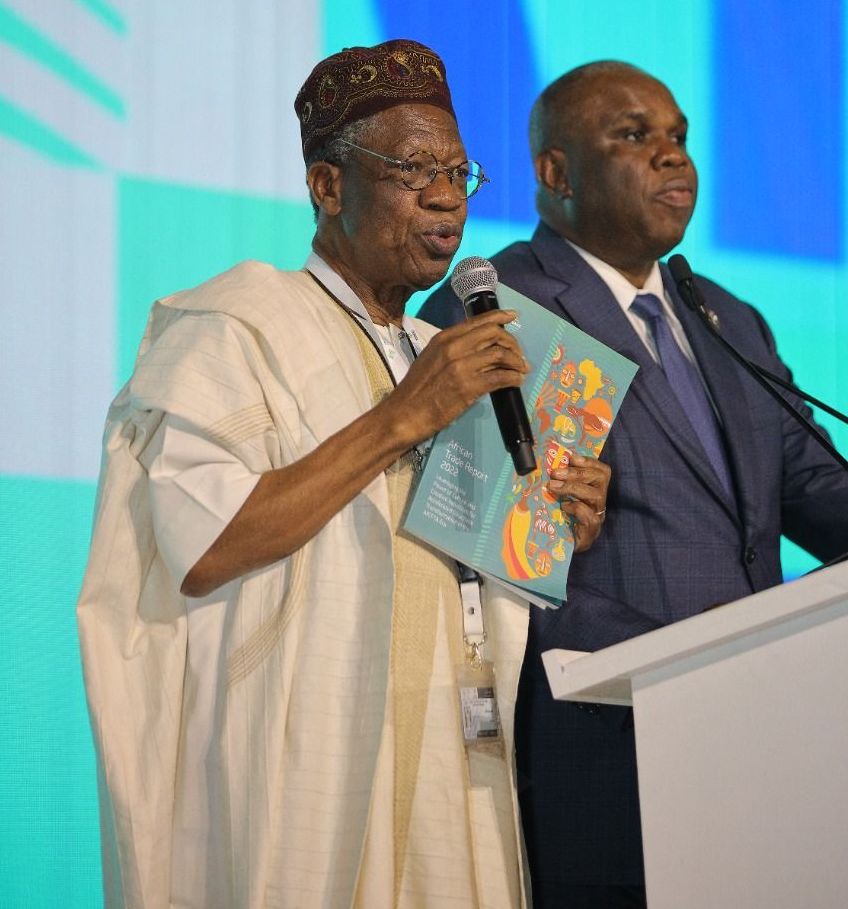Afreximbank launches African Trade Report 2022

Africa’s trade grew significantly as the world gradually recovered from the COVID-19 pandemic, Professor Benedict Oramah, President and Chairman of the Board of Directors of African Export-Import Bank (Afreximbank), said in Cairo.
Launching the African Trade Report along with H.E. Mr Lai Mohammed, Minister of Information, Culture and Tourism of the Federal Republic of Nigeria, at the 29th Afreximbank Annual Meetings (AAM2022), Professor Oramah said that Africa showed resilience during the COVID-19 pandemic, contracting by only 1.6% in its first recession in 25 years and rebounding strongly with GDP expanding by about 6.9% in 2021.
“African trade grew significantly just as the world was gradually recovering from the COVID-19 pandemic,” he said, adding that intra-African trade was resilient, notwithstanding the restrictions imposed by COVID-19.
He attributed Africa’s resilience to coordinated responses from governments, development finance institutions, multilaterals, including the IMF through its Rapid Credit Facility and Afreximbank through its Pandemic Trade Impact Mitigation Facility (PATIMFA).
Dr Hippolyte Fofack, Afreximbank’s Chief Economist, noted however that despite the increasing resilience of African economies, the region remained a peripheral contributor to global trade and growth, accounting for 2.6% of global trade and less than 3% of the world’s GDP.
In order to increase its share of global growth and trade and to foster its integration into the global economy, Africa must use the AfCFTA, which has been touted as a game changer, to accelerate the process of structural transformation and growth, he quoted the report as recommending.
Professor Oramah said that Africa also needed to develop sectors which had not been fully exploited, such as the creative and cultural industries (CCIs), as those were among the fastest growing in the world, generating US$ 2.25 trillion (3% of global GDP), and employing more than 30 million people, They have the power to boost job creation and economic growth in the digitalisation era, even though they have only received limited attention.
Dr Fofack said Africa’s creative industries could be the 21st century goldmine that sustains economic growth and structural transformation:
“Leveraging Africa’s rich cultural heritage and the creative power of its youth can drive both cultural renaissance and economic transformations in the AfCFTA era where intellectual property rights will be sacrosanct. The CCIs have the power to boost economic growth and deepen economic integration by fuelling a cultural convergence,” he said.
Dr. Fofack added that CCIs were a growth industry in Africa, with Nollywood becoming the world’s second largest film producer and exporter and the African gaming industry projected to grow by 12% by 2025. It was for those reasons that the African Union declared 2021 the Year of the Arts, Culture and Heritage: Levers for Building the Africa We Want, he said.
Globalisations and new technologies which have accelerated cultural interactions among countries, are set to further catalyse the growth of African CCIs at a time when digitalisation and the creative power of African youth are enabling the world to rediscover Africa’s rich cultural heritage and beauty.
Afreximbank, through its Creative African Nexus (CANEX), has emerged as a key player in the industry, reducing the capital gap faced by African creative organisations and investing in young talent to harness their creative power. H.E. Mr Lai Mohammed, Minister of Information, Culture and Tourism of the Federal Republic of Nigeria, praised Afreximbank for its support of the CCIs across Africa.
“I recommend that everyone reads this African Trade Report 2022 because it shows that Africa has a bright future,” he said.
The Africa Trade Report focuses on the theme “Leveraging the Power of Culture and Creative Industries for Accelerated Structural Transformation in the AfCFTA era.”

